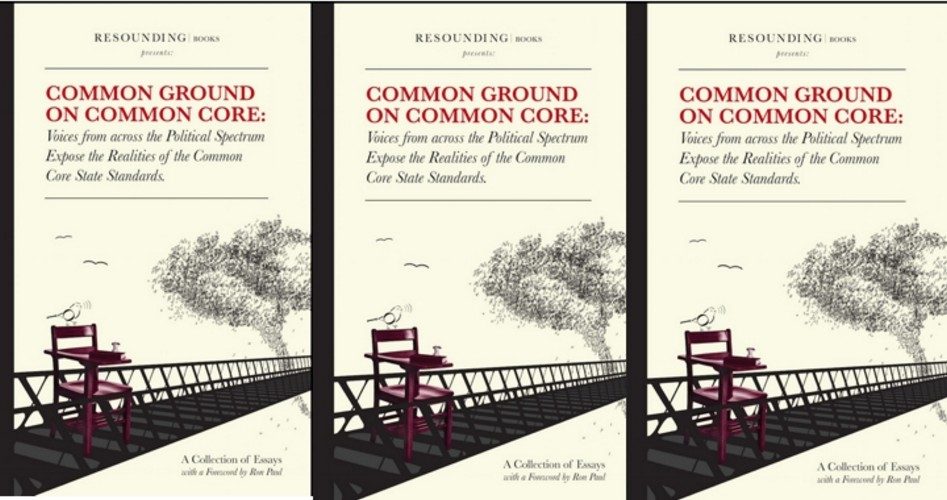
Common Ground on Common Core: Voices From Across the Political Spectrum Expose the Realities of the Common Core State Standards, a collection of essays edited by Kirsten Lombard, Madison, Wisconsin: Resounding Books, 2014, 391 pages, paperback.
The entire marketing plan for the establishment’s nationalization of education via the Common Core standards is pulverized in this one book. Literally every key selling point used to impose the controversial scheme — from the notion that it will “improve” education and produce “college- and career-ready” students, to the easily discredited claim that it was a “state-led” project — is demolished in spectacular fashion in the pages of this collection.
Unlike much of the work exposing the flaws and problems with Common Core thus far, this new body of knowledge attacks the plan from multiple angles and points all across the political spectrum. It also offers a wide range of potential avenues to stopping Common Core and marvelous visions of real education that are within reach.
As any credible exposé of this Obama administration-backed educational nightmare must, the book devotes considerable space to exposing the atrocious standards themselves — how they teach students what to think rather than how to think, the political indoctrination, the lack of rigor, the failed and experimental pedagogical strategies, the confusion and distress suffered by students and parents alike, and much more. After reading the evidence presented in the book, nobody could seriously claim that these “standards” are appropriate or beneficial, much less a reasonable approach to impose on the entire nation.
Among the many experts who contributed essays to the collection is Dr. Sandra Stotsky. The widely respected professional in the education field was the only English Language Arts (ELA) subject-matter expert selected to serve on the Common Core Validation Committee. In her masterful contribution to the book, Stotsky, who refused to sign off on the scheme as part of the validation committee, exposes many of the glaring deficiencies with the standards. Contrary to the myths and falsehoods spread by Common Core proponents, Stotsky’s chapter breaks down the ELA standards using various metrics and finds them sorely lacking.
The only other subject-matter expert selected to serve on the Common Core Validation Committee, Dr. James Milgram of Stanford, also refused to sign off on the standards. Working with another expert, he too contributed a deeply revealing essay to the book, exposing the major problems with the mathematics component of the scheme. Also exposed is what Milgram called the “sham” validation process he was asked to participate in. In essence, Milgram, a celebrated mathematician, explains how Common Core redefines “college-readiness” far below where authentic college-readiness is. But it is even worse than that.
Other essays in the book come from parents, educators, and mental health professionals who have witnessed firsthand the damage and pain inflicted on children by Common Core. The horror stories recounted in various essays throughout the collection are enough to make one’s stomach turn. Perfectly healthy and happy children, for instance, are being reduced to inconsolable sobbing messes in the face of this Orwellian education experiment and its accompanying frenzy of standardized testing and half-baked experimental approaches to learning. With Common Core taking root across the country, the tragedies add a sense of urgency to the task of uprooting the scheme before it wreaks further havoc.
The privacy implications of Common Core and its related tentacles represent another important line of attack that is sure to infuriate and trouble parents across America regardless of their political or religious views. Big Brother on steroids wants to know everything about every child for purposes of tracking, central planning, interventions, and more. The book does a fantastic job of exposing the ongoing destruction of what little privacy remains.
“In light of the growing revelations that the federal government is engaging in massive invasion of privacy in spheres other than education, it is utterly impossible to believe that these databases will not be mined and misused to serve the ulterior purposes of a centralized government intent on growing its own power,” observes Home School Legal Defense Association (HSLDA) attorney William Estrada in his essay exposing the fundamental problems with educational centralization. Separately, Estrada, citing hard data and research, calls Common Core’s one-size-fits-all plan the “worst possible approach” if the goal is truly to create students who are ready for college and career.
In addition to the federal government’s rapidly expanding control over education, one essay also briefly highlights the United Nations’ growing role in global standardization and “reform.” From exposing the links between Common Core financier Bill Gates and the UN to quoting Obama Education Secretary Arne Duncan’s own words to UNESCO bureaucrats, the book touches on this hugely important but widely overlooked element, which sheds more light on the real agenda behind what is currently occurring in American schools.
Taken together, Common Ground on Common Core may be the single most devastating indictment of the standards to date. For one, through the tragic stories of parents and teachers, the book puts a human face on the real damage that is being inflicted on children — the suffering, the stress, the emotional harm, the dumbing down. It also offers a chilling window into what the future might look like if Americans do not rise up and put a stop to what the establishment has in mind: a totally regimented and centrally planned society in which children are treated as a “human resource” to be molded, tracked, and, eventually, assigned a role in the emerging Brave New World.
Perhaps among its most important attributes, the book also demolishes the establishment-promoted myths about the opposition to Common Core — the cartoonish characterization of critics used to marginalize and silence those who actually care most about the children. Opponents of these standards are not “extremists,” or “right-wing activists,” or “conspiracy theorists,” or “left-wing kooks,” or anything else. By and large, they are concerned Americans — parents, teachers, taxpayers, citizens — from all across the political spectrum who love their children and their country.
That is important for a number of reasons. “Common Core has remarkably facilitated common ground,” writes book editor Kirsten Lombard in a brief introduction to the collection. “Not just a tiny patch, either; it’s significant real estate. This reality makes us far more difficult to marginalize or dismiss — that, as a heterogeneous group of informed individuals, we demonstrate so much overlap in our respective concerns. Even in those areas where disagreement proves sticky, a growing willingness exists to reject shallow talking points, talk deeply, listen carefully, and understand.”
Indeed, even though there are plenty of points within individual essays that conservatives, constitutionalists, libertarians, and others will disagree with, reading outside perspectives provides fresh food for thought — especially as it relates to the role of Big Business and crony capitalists involved in the fraudulent “education reform” machinations, which are often overlooked by those on the Right who tend to focus more on the scheming of Big Government. Both of those forces have played a major role in bringing American education to its present state, and so both must be understood if Common Core is to be consigned to the ashbin of history before it further damages American children.
Also, as the book itself explains, if Americans hope to free the nation from the miseducation regime that has been foisted on children using the cover of darkness, it will require collaboration and discussion across traditional political divides — many of which have been exploited and fanned by forces interested in dividing and conquering the growing opposition to their plotting. Republicans and conservatives, for instance, will not be able to do what must be done on their own. Nor will liberals or Democrats.
Of course, cooperation and discussion does not necessarily mean compromising on principle. However, pragmatically speaking, beating back the immensely powerful alliance of Big Government and Big Business will demand all hands on deck. To restore real education in America will require cross-party cooperation if it is to succeed. This book helps lay a solid foundation for that to emerge, with powerful voices from across the political spectrum coming together in common cause.
The final essay contained in Common Ground on Common Core is also among the most fascinating. For one, it challenges readers to imagine what education might look like in a truly free society — one in which education is no longer a function of self-serving government bureaucracies, but of parents, philanthropies, religious organizations, businesses, entrepreneurs, individuals, and free people generally. Such a dream may seem far off — and certainly not all of the book’s contributors share such a vision. Still, the writer makes thought-provoking arguments in favor of liberty, pointing to, for example, the virtually unregulated market for smartphones as an illustration of how freedom and competition produce constant innovation and unparalleled customer satisfaction.
Armed with the knowledge, perspectives, and evidence provided in Common Ground on Common Core, Americans still have the power to stop this educational train wreck before it finishes destroying tens of millions of innocent children. Anybody with an interest in children and education — parents, taxpayers, family, teachers, and more — will find much of value in this book. Considering that children represent the future of America, any American who hopes to preserve the legacy of freedom for future generations must know what is going on in the schools. And if freedom and critical thinking are to survive into the future, Americans must ensure that the establishment does not succeed in producing a generation of
dumbed-down “Common Core” kids.
To order Common Ground on Common Core, click here.



